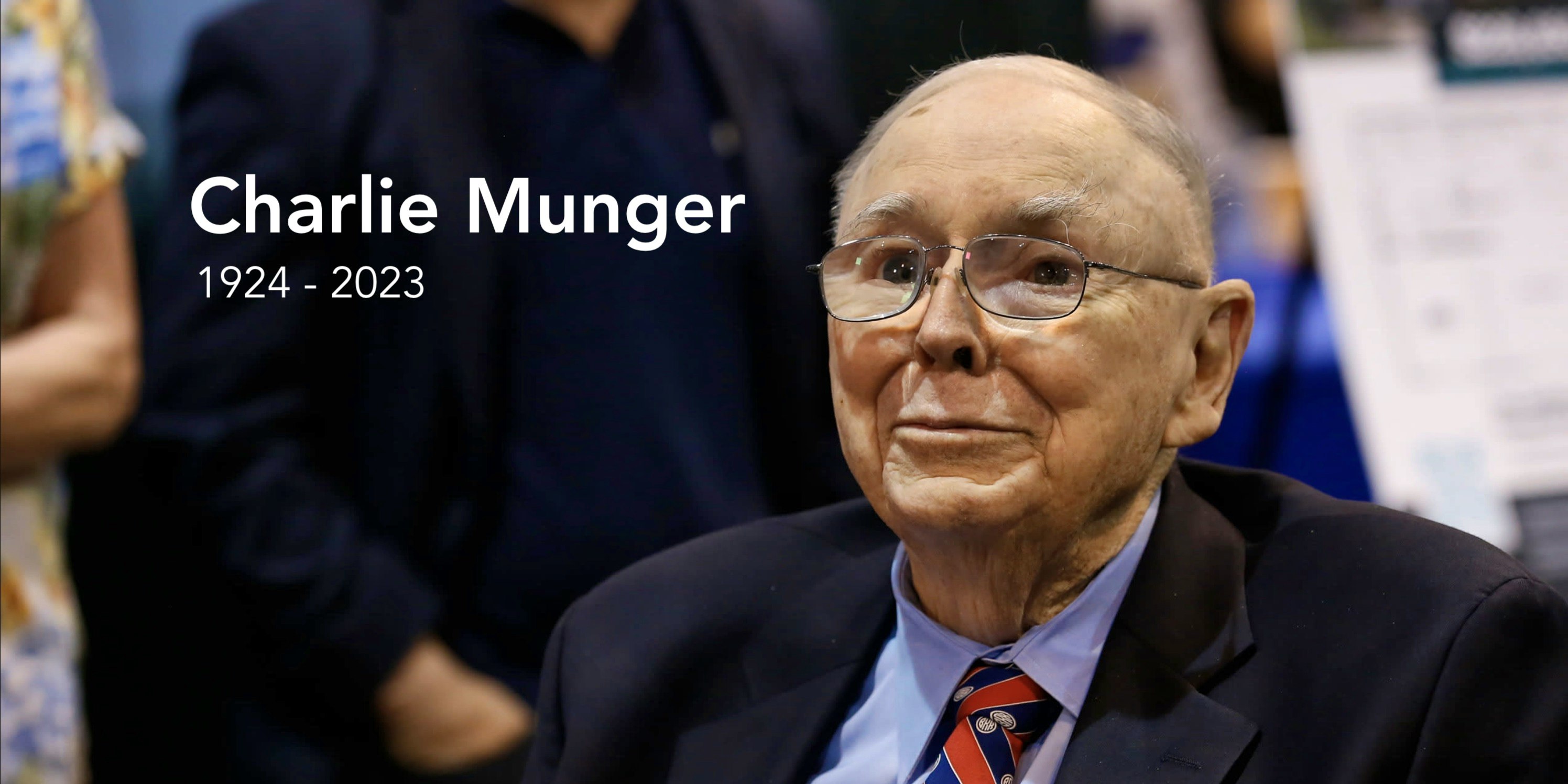Remembering Charlie Munger

In 1949, Charlie Munger was 25 years old. He was hired at the law firm of Wright & Garrett for $3,300 per year, or $42,000 in inflation-adjusted dollars.
A few years later, in 1953, Charlie was 29 years old when he and his wife divorced. He had been married since he was 21. Charlie lost everything in the divorce, his wife keeping the family home in South Pasadena. Munger moved into “dreadful” conditions at the University Club and drove a terrible yellow Pontiac, which his children said had a horrible paint job. According to the biography written by Janet Lowe, Molly Munger asked her father, “Daddy, this car is just awful, a mess. Why do you drive it?” The broke Munger replied: “To discourage gold diggers.”
Shortly after the divorce, Charlie learned that his son, Teddy, had leukemia. In those days, there was no health insurance, you just paid everything out of pocket and the death rate was near 100% since there was nothing doctors could do. Rick Guerin, Charlie’s friend, said Munger would go into the hospital, hold his young son, and then walk the streets of Pasadena crying.
One year after the diagnosis, in 1955, Teddy Munger died. Charlie was 31 years old, divorced, broke, and burying his 9 year old son. Later in life, he faced a horrific operation that left him blind in one eye with pain so terrible that he eventually had his eye removed.
It’s a fair bet that your present troubles pale in comparison. Whatever it is, get over it. Start over. He did it. You can, too.
But by the time he was 69 years old, he had become one of the richest 400 people in the world, been married to his second wife for 35+ years, had eight children, and countless grandchildren.
Beyond investing and business, Charlie teaches us about resilience, dignity, and grit.
Rest in peace to a legend.
One thing that Charlie was exceptional at was clear thinking. Munger was a voracious learner and one of the world’s best observers of human behavior. Charlie liked to study human psychology to learn how people make (sometimes wrong) decisions. In 1995, Charlie gave a speech at Harvard University about human decision-making and factors contributing to misjudgments. He wanted to share what he had observed and learned; models he used that helped him (and Berkshire Hathaway) succeed.
The original speech can be found here:
Fifteen years later he revised and expanded his speech in written form: "The Psychology of Human Misjudgment". It's a fantastic read that can really help us understand why supposedly rational masses of people can end up being so wrong. In the tech world, it ends up being more relevant than one would like it to be.
“If people weren’t so often wrong, we wouldn’t be so rich”
— Charlie Munger - 2015 Berkshire Hathaway annual shareholders meeting
Here's "The Psychology of Human Misjudgment" summary in bullet points:
-
Reward and Punishment Superresponse Tendency: Decisions are profoundly influenced by incentives and disincentives.
-
Liking/Loving Tendency: The tendency to especially like, and often irrationally, one's own kind, family, and friends.
-
Disliking/Hating Tendency: The flip side of liking/loving – a tendency to hate and dislike, often irrationally.
-
Doubt-Avoidance Tendency: The brain reaches a decision quickly to remove doubt and avoid uncertainty.
-
Inconsistency-Avoidance Tendency: People are reluctant to change their minds once a decision has been made.
-
Curiosity Tendency: Natural curiosity leads to exploratory behavior and acquisition of knowledge.
-
Kantian Fairness Tendency: A drive towards fairness, often manifesting in a "I won't do it to you, if you don't do it to me" mentality.
-
Envy/Jealousy Tendency: Discontent at the superiority of others.
-
Reciprocation Tendency: A strong inclination to return favors and disfavors.
-
Influence-from-Mere-Association Tendency: Associations, even irrational or accidental ones, influence our thoughts and decisions.
-
Simple, Pain-Avoiding Psychological Denial: Denying the reality of unpleasant facts.
-
Excessive Self-Regard Tendency: Overestimating our own abilities and worth.
-
Over-Optimism Tendency: Being overly optimistic, underestimating difficulties and obstacles.
-
Deprival-Superreaction Tendency: Overreacting to the possibility of losing something already possessed.
-
Social-Proof Tendency: Imitating the behavior of many others, especially peers.
-
Contrast-Misreaction Tendency: Judgments influenced by the contrast between current information and what has been experienced in the past.
-
Stress-Influence Tendency: Impaired decision-making and distorted perceptions under stress.
-
Availability-Misweighing Tendency: Overweighing information that is readily available.
-
Use-It-or-Lose-It Tendency: Skills and knowledge deteriorate unless practiced and refreshed.
-
Drug-Misinfluence Tendency: Altered decision-making due to the influence of drugs or alcohol.
-
Senescence-Misinfluence Tendency: Cognitive decline with age affecting decision making.
-
Authority-Misinfluence Tendency: Over-relying on the opinion of authorities.
-
Twaddle Tendency: Tendency to focus on insignificant information and chatter.
-
Reason-Respecting Tendency: A preference for actions and thoughts that are justified with reasons, even if the reasons are not sound.
-
Lollapalooza Tendency: The combination of multiple psychological tendencies acting together to produce extreme outcomes, either positive or negative.
